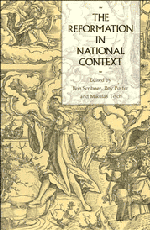8 - Bohemia
Published online by Cambridge University Press: 04 December 2009
Summary
Reformation - understood as a new approach to the evangelical message, as the rise of a new religious doctrine and of churches independent of the papacy, and involving radical changes in society - occurred at an earlier date in the Czech Kingdom than elsewhere in Europe. The crisis of spiritual and social life accompanied by socio-political shocks, from which the Reformation of the sixteenth century arose, hit the lands of the Czech crown much earlier, indeed in the latter part of the fourteenth century. Similar developments took place in England and Northern Italy, but in the Czech Kingdom the gradual accumulation of various contradictions created favourable conditions for the crisis to result in a real Reformation and in the Hussite revolution (1419-36). The Czech Reformation laid the foundations for this revolution and created its ideology, but it also drew on it in turn for its stimuli. Thanks to the successful revolution neither the Roman Church nor the secular power were able to suppress this first Reformation; they only succeeded in limiting it to the Czech national context, where it developed further, even in the post-revolutionary period, isolated from the rest of the orthodox Catholic world, which held in contempt its followers (that is, the majority of the Czech nation who adhered to its doctrines), calling them schismatics and heretics. Only at the beginning of the sixteenth century did the Czech Reformation encounter another wave of reformation in neighbouring Germany and thus find its historical fulfilment.
- Type
- Chapter
- Information
- The Reformation in National Context , pp. 131 - 154Publisher: Cambridge University PressPrint publication year: 1994
- 6
- Cited by

